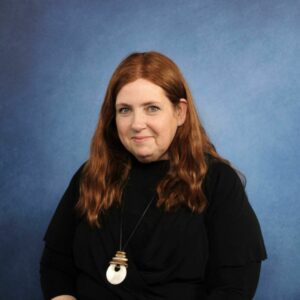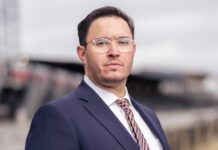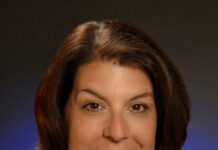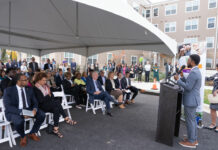When Rachel Turniansky was growing up in New York City, she attended a disability-inclusive school where she befriended several deaf students. She learned sign language while she was still in elementary school because she wanted to communicate better with them.

This would prove to be the impetus for a long and fruitful career focused on disability support.
“Public schools have a lot of inclusive opportunities for students with disabilities, but they’re usually not structured so that they can interact with other students very much,” Turniansky said of her early interest in disability support. “I credit the fact that I was able to interact with them as individuals and get to know them. It made me see at a young age that individuals with disabilities are just people, and they can be your friends.”
Now 57, the Pikesville resident is the director of disability and inclusion services at the Macks Center for Jewish Connections. In this role, she helps members of the Baltimore Jewish community who are living with disabilities access resources to help them participate in Jewish life in an inclusive and accommodating way. She lives with her husband and two adult children and attends Suburban Orthodox Toras Chaim.
The impact of her work has been far-reaching. In 2022, the Darrell D. Friedman Institute for Professional Development awarded Turniansky with the Neely Tal Snyder Community Impact Award.
Before she worked at the Macks Center, Turniansky was a special educator. She spent several years working in both the Baltimore City Public Schools system and at the Gateway School, a nonpublic school for children with autism and other developmental disabilities.
Over the time she spent working with different students, she would see them make small progress toward overcoming some of their personal challenges — something she found very impactful.
“I appreciate celebrating small progress, as opposed to setting the unrealistic expectation of getting students to be ‘normal,’” she said. “It was very rewarding to see where students were in terms of their abilities, and to see them have small victories as well as large ones.”
She continues to put her educational skills to good use as the principal of Gesher LaTorah, the Macks Center’s Sunday school program for students with special needs.
Turniansky first got involved with the Macks Center while looking for part-time work. A friend recommended the organization to her, and she would later be elected as the director of disability and inclusion services.
Fittingly, considering the origins of her interest in disability support and education, Turniansky’s work includes working with deaf and hard of hearing members of the Jewish community. The Macks Center is home to Jewish Advocates for Deaf Education, or JADE, which provides transcription, captioning and interpretive services as well as social opportunities like the Deafblind Shabbaton. She also helps manage projects that advocate for people with disabilities, like advocating for children through the Maryland Special Needs Advocacy Project.
“Inclusion of any kind is a really Jewish value. It’s rooted in Jewish tradition and Jewish sources,” Turniansky said. “We really advocate for our community to be consistent with that value, and we should celebrate that they deliver.”
People living with disabilities face many unique societal challenges, in addition to physical and mental ones. A 2016 report from the U.S. Department of Health and Human Services noted that people with disabilities often receive lower-quality care and pay higher health care costs than those who are physically and mentally abled. Many are unable to work, and marriage equality is still not a reality for many with disabilities — they may be at risk of losing their SSI and Medicaid benefits if their and their partner’s combined income is too high, according to the National Council on Independent Living.
In the Jewish community specifically, Turniansky noted that houses of worship like synagogues are exempt from the Americans with Disabilities Act and are not legally obligated to have accessible buildings. While many have taken it upon themselves to add accessible features, it is not a sure thing for every synagogue.
“There has to be an effort to individualize [in the Jewish community],” she said. “You can’t just have them check a box and suddenly become inclusive. It’s always a work in progress.”
Turniansky added that encouraging Jewish people with disabilities to engage with their local community can be beneficial for everyone involved. She hopes to see more Jewish organizations take steps to become more accessible, and she noted that she is always dedicated to supporting community organizations who decide they want to be more inclusive of people with disabilities.
“The Jewish community is very rich as a support system. Seeing people connecting and finding resources can be very rewarding,” she explained. “Making those connections gets people to understand that inclusion does not only benefit people with disabilities, and the entire community is better when everyone is able to participate.”







